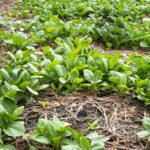Introduction: Explaining the importance of keeping vegetable gardens weed-free and the potential risks of using harmful pesticides (such as Weed B Gon) that might affect the edible produce.
Vegetable gardens are not only a source of fresh, healthy food but also a labor of love for many gardeners. The satisfaction of growing one’s own vegetables is unparalleled, but it comes with its fair share of challenges.
Weeds, in particular, are unwelcome intruders that can wreak havoc on the carefully tended plot. While weed control is essential to maintain the health and productivity of vegetable gardens, it is equally important to consider the safety of any pesticides or herbicides used, such as Weed B Gon.
Weed B Gon is a widely used herbicide that claims to effectively eliminate unwanted weeds in various settings. However, using such products in vegetable gardens raises concerns about their impact on the edibility and safety of homegrown produce.
Pesticides like Weed B Gon contain chemicals that can potentially pose risks when consumed by humans or absorbed by vegetables. It becomes imperative for gardeners to understand these potential risks and explore alternative methods that ensure both weed control and the integrity of their edible crops.
In this article, we will delve into the topic of whether Weed B Gon is safe for use in vegetable gardens. We will discuss its active ingredients, effectiveness against weeds, and examine its potential hazards to both plants and consumers alike.
Furthermore, we will explore alternative approaches to weed control that prioritize organic practices and sustainable gardening methods. By considering these factors, gardeners can make informed decisions about their choice of herbicides and adopt practices that safeguard both their beloved plants and themselves from unnecessary harm.
Understanding Weed B Gon
Weed B Gon is a commonly used herbicide that is designed to control and eliminate various types of weeds. The active ingredients in Weed B Gon can vary depending on the specific product, but it typically contains chemicals such as 2,4-Dichlorophenoxyacetic acid (2,4-D) and Dicamba. These ingredients work by disrupting the growth hormones in weeds, ultimately leading to their death.
When used as directed, Weed B Gon is generally effective at killing many different types of weeds. It can be applied using a sprayer or a ready-to-use spray bottle, making it easy to target specific areas where weeds are present. However, it is important to note that Weed B Gon is a selective herbicide, meaning that it will kill broadleaf weeds while sparing most grasses.
It is also worth noting that the effectiveness of Weed B Gon can depend on various factors such as weather conditions, application timing, and the specific type of weed being targeted. In general, it is recommended to apply Weed B Gon when temperatures are between 60-85 degrees Fahrenheit and when the target weeds are actively growing.
| Active Ingredients | Effectiveness | Application Methods |
|---|---|---|
| 2,4-Dichlorophenoxyacetic acid (2,4-D) | Effective against broadleaf weeds | Sprayer or spray bottle |
| Dicamba | Selective herbicide for broadleaf weeds | Sprayer or spray bottle |
Weed Control in Vegetable Gardens
Vegetable gardens require careful weed control to ensure the health and productivity of the plants. While chemical herbicides like Weed B Gon may be effective in controlling weeds, there are alternative methods that are safer for both the environment and the vegetables grown. In this section, we will discuss various methods of weed control specifically tailored for vegetable gardens.
- Natural Methods: One of the most common and eco-friendly ways to control weeds in a vegetable garden is through natural methods. This involves regular maintenance practices such as hoeing or cultivating the soil to disrupt weed growth, pulling weeds by hand, or using manual tools like a trowel or garden fork. This method requires patience and consistent effort but can result in effective weed control without the use of any chemicals.
- Mulching: Another method of weed control in vegetable gardens is through mulching. Applying a layer of organic mulch around plants helps suppress weed growth by blocking sunlight from reaching the soil surface, preventing weed seeds from germinating. Examples of organic mulch include straw, wood chips, shredded leaves, or grass clippings. It not only controls weeds but also conserves moisture in the soil and regulates temperature.
- Organic Herbicides: For those who prefer using herbicides but want an organic option, there are several organic herbicides available on the market that can be used safely in vegetable gardens. These herbicides contain natural ingredients derived from plant oils or minerals that effectively kill weeds without harming your crops. Ingredients such as vinegar-based solutions or citrus oil extracts target weeds while being safe for edible plants.
It is important to note that every vegetable garden is unique and may require different combinations of these methods for effective weed control. Experimentation with different techniques can help determine what works best for your specific garden conditions and preferences. By utilizing natural methods, mulching, or organic herbicides, you can maintain a healthy and productive vegetable garden while minimizing potential risks to yourself, your crops, and the environment.
Evaluating the Safety of Weed B Gon
When it comes to selecting a weed control product for vegetable gardens, it is crucial to carefully evaluate its safety considerations. Weed B Gon is a commonly used herbicide that promises effective weed control. To determine if it is safe to use in vegetable gardens, several factors need to be considered including its chemical composition, application methods, and potential residual effects.
Weed B Gon contains active ingredients such as 2,4-Dichlorophenoxyacetic acid (2,4-D) and Dicamba. These chemicals work by disrupting the growth hormones in plants and eventually leading to their death. While these ingredients are effective against weeds, they can pose potential risks if not used correctly or in excessive amounts.
For instance, research has shown that prolonged exposure to 2,4-D can cause adverse health effects like respiratory problems and skin sensitization. Therefore, gardeners should exercise caution when using Weed B Gon and follow the recommended guidelines provided by the manufacturer.
Application methods also play a significant role in evaluating the safety of Weed B Gon in vegetable gardens. It is essential to apply this herbicide precisely as directed on the label to minimize any potential risks.
Over-application can lead to herbicide drift or run-off into water sources, which may harm nearby vegetation or contaminate water bodies. To ensure safe use of Weed B Gon in vegetable gardens, it is important to avoid spraying during windy conditions and take necessary precautions to prevent any accidental spillage or leaks.
To evaluate the potential residual effects of using Weed B Gon in vegetable gardens, it is crucial to consider how long the herbicide remains active in soil or plant tissues. Residual effects depend on various factors such as soil type, climate conditions, application rate, and the specific vegetables being grown. Gardeners should be aware that Weed B Gon, like many herbicides, can persist in the environment for an extended period.
This may have implications on the health of vegetables, soil fertility, and long-term sustainability of the garden. Therefore, it is recommended to follow any specified waiting periods before harvesting edible produce after applying Weed B Gon.
| Factor | Safety Considerations |
|---|---|
| Chemical composition | – Active ingredients may pose potential risks if not used correctly or in excessive amounts. |
| Application methods | – Over-application can lead to herbicide drift or run-off into water sources. |
| Residual effects | – Potential impact on vegetable health, soil fertility, and long-term garden sustainability. |
Potential Hazards to Vegetable Gardens
Using chemical herbicides like Weed B Gon in vegetable gardens may pose potential hazards to the health of vegetable plants, soil fertility, and the long-term sustainability of the garden. It is important for gardeners to understand these possible adverse effects before deciding to use such products in their vegetable gardens.
One potential hazard of using chemical herbicides like Weed B Gon is the impact on the health of vegetable plants. While Weed B Gon is designed to target and eliminate weeds, there is a risk that it may also harm desirable plants if proper precautions are not taken.
The chemicals in Weed B Gon can be absorbed by the foliage or roots of vegetables, leading to stunted growth, leaf discoloration, or even death. In some cases, ingestion of vegetables treated with Weed B Gon can also have negative health effects on humans.
Soil fertility is another concern when using chemical herbicides in vegetable gardens. Many herbicides contain chemicals that can leach into the soil and disrupt the delicate balance of nutrients and microorganisms necessary for healthy plant growth. This can lead to nutrient deficiencies in vegetables and reduce overall soil fertility over time. Additionally, repeated use of herbicides like Weed B Gon may result in the development of herbicide-resistant weeds, further complicating weed control efforts.
The long-term sustainability of the garden itself can also be at risk when using chemical herbicides. These products have the potential to accumulate in the environment and disrupt natural ecosystems. Runoff from treated areas can contaminate nearby water sources and impact aquatic life. Furthermore, reliance on chemical herbicides may lead to a loss of biodiversity as certain species are selectively targeted while others are harmed or eliminated.
To mitigate these hazards, it is essential for gardeners to consider alternative methods of weed control that are safe for vegetable gardens. Organic herbicides made from natural ingredients can be effective in controlling weeds without posing significant risks to edible plants. Homemade weed killers utilizing common household ingredients such as vinegar or salt can also be utilized.
Companion planting, which involves growing specific plants together to deter weeds, is another eco-friendly option. By choosing these sustainable methods and incorporating proper weed management practices, gardeners can maintain a healthy vegetable garden while minimizing potential hazards.
Eco-Friendly Alternatives
Organic Herbicides
One of the most popular eco-friendly alternatives to chemical herbicides like Weed B Gon is the use of organic herbicides. These products are made from natural ingredients and are designed to target and eliminate weeds without harming vegetable plants or the surrounding environment. Organic herbicides often contain active ingredients such as vinegar, citric acid, or essential oils derived from plants like clove or citrus.
When using organic herbicides in vegetable gardens, it’s important to carefully follow the instructions on the label to ensure effective and safe application. It’s also worth noting that organic herbicides may require multiple applications for optimal weed control, as they generally have a more gentle and gradual impact compared to their chemical counterparts.
However, this drawback is often outweighed by the benefits of using a safe and non-toxic product in a garden where edible produce will be harvested.
Homemade Weed Killers
For gardeners who prefer a DIY approach, homemade weed killers can be an effective and eco-friendly option. Most homemade weed killers utilize common household ingredients like vinegar, salt, or dish soap. For example, a mixture of white vinegar (which contains acetic acid) and water can be sprayed directly onto weeds to kill them effectively. Similarly, combining salt with hot water can create a powerful solution for weed control.
It’s important to note that while homemade weed killers are generally safe for vegetable gardens when used properly, some ingredients may have residual effects on the soil over time. To mitigate this risk, it’s recommended to use homemade weed killers sparingly and only on targeted areas where weeds are present.
Companion Planting
Another sustainable method for controlling weeds in vegetable gardens is companion planting. Companion planting involves strategically growing certain plants together that provide mutual benefits such as pest deterrence, enhanced soil fertility, and weed suppression. For instance, planting marigolds around vegetable crops can effectively deter insects and suppress weeds due to their strong fragrance and ability to release chemicals into the soil that inhibit weed growth.
In addition to marigolds, other companion plants that have been found beneficial for weed control include clover, buckwheat, and white Dutch clover. These plants help smother weeds by outcompeting them for resources like sunlight, water, and nutrients. Implementing companion planting techniques not only reduces the need for chemical or manual weed control methods but also creates a more diverse and ecologically balanced garden ecosystem.
By utilizing organic herbicides, homemade weed killers, or employing companion planting techniques, gardeners can effectively control weeds in their vegetable gardens without resorting to potentially harmful pesticides like Weed B Gon. These eco-friendly alternatives offer a safe and sustainable approach to maintaining weed-free gardens while preserving the health of edible produce and supporting overall environmental well-being.
Consumer Experiences and Expert Opinions
Real-life Anecdotes from Gardeners
When it comes to assessing the safety and effectiveness of a product like Weed B Gon in vegetable gardens, it is valuable to consider the experiences and anecdotes of those who have actually used it. Many gardeners have varying opinions and insights based on their personal experiences with Weed B Gon.
Some gardeners have reported positive results when using Weed B Gon in their vegetable gardens. They have found that the product effectively controls weeds without causing harm to their edible crops. These individuals praise its convenience and ease of use, as well as its ability to target specific weed types. However, it is important to note that these positive experiences are not universal, and caution should be exercised before assuming that the same outcome will occur in every situation.
On the other hand, there are gardeners who have had negative experiences with Weed B Gon in their vegetable gardens. Some users have reported stunted growth or damage to their vegetables after applying the herbicide. Others claim that the product did not effectively control weeds or that its effects were only temporary, requiring frequent reapplication. These anecdotal accounts highlight the potential risks and downsides associated with using Weed B Gon, emphasizing the need for careful consideration and further research.
Expert Opinions and Advice
To further assess whether Weed B Gon is safe for vegetable gardens, it is essential to consult expert opinions from horticulturists and experienced gardeners. These specialists can provide valuable insights based on scientific research and years of practical experience.
Some experts caution against using Weed B Gon in vegetable gardens due to its active ingredients, which may pose risks to both plants and humans. They suggest exploring alternative methods of weed control that are more compatible with edible crops. Experts also encourage gardeners to prioritize prevention techniques such as mulching or hand weeding before relying on chemical herbicides.
Conversely, other experts argue that Weed B Gon can be used safely in vegetable gardens if applied correctly. They stress the importance of following the product label instructions precisely, including the appropriate application rates and timing. These experts claim that when used as directed, Weed B Gon can effectively control weeds without harming vegetables. However, they also emphasize the importance of conducting a small-scale test before applying it extensively throughout the garden.
Recommendations and Guidelines
When it comes to using Weed B Gon in vegetable gardens, it is important for gardeners to carefully consider the potential risks and benefits before making a decision. Based on the information presented regarding Weed B Gon’s chemical composition and potential hazards, many gardeners may choose to avoid using this product altogether to ensure the safety of their edible produce.
However, if you do decide to use Weed B Gon in your vegetable garden, here are some recommendations and guidelines to follow:
- Read and follow the label instructions: Before using Weed B Gon or any other herbicide in your garden, it is crucial to thoroughly read and understand the label instructions. Pay close attention to any specific precautions or restrictions related to vegetable gardens.
- Choose a safe application method: When applying Weed B Gon in your vegetable garden, consider using a targeted spot treatment method rather than spraying the entire area. This will help minimize exposure to both the plants you want to keep and any nearby edible produce.
- Time your applications appropriately: Be mindful of the stage of growth of your vegetables when considering the timing of your herbicide applications. Ideally, apply weed killers like Weed B Gon before planting or after harvesting to avoid direct contact with young or mature crops.
- Use protective measures: To protect yourself while using Weed B Gon, wear proper protective clothing such as gloves, long sleeves, pants, and closed-toe shoes. Additionally, consider wearing a mask or respirator when applying herbicides as an extra precaution.
- Monitor for weeds regularly: Rather than relying solely on herbicides like Weed B Gon, make regular inspections of your vegetable garden for any new weed growth. Promptly remove any weeds by hand-weeding or using other organic methods.
It is important to note that choosing organic and eco-friendly weed control alternatives, as mentioned in the previous section, may be the best approach for maintaining a safe and sustainable vegetable garden. By using natural methods and organic herbicides, you can effectively control weeds while minimizing the potential risks to your edible produce.
Conclusion
In conclusion, when it comes to weed control in vegetable gardens, it is crucial to make informed decisions that prioritize the health of plants, consumers, and the environment. The use of harmful pesticides like Weed B Gon can pose potential risks to edible produce and have adverse effects on soil fertility and long-term garden sustainability. As a responsible gardener, it is important to consider eco-friendly alternatives that are safe for vegetable gardens.
There are various methods of weed control specifically tailored for vegetable gardens that can be employed. Natural methods such as hand weeding and mulching are effective ways to minimize weed growth without causing harm to the environment or edible produce. Additionally, organic herbicides can be used as a safer option for controlling weeds in vegetable gardens. Homemade weed killers and companion planting techniques can also be explored as sustainable alternatives.
It is essential to consider consumer experiences and expert opinions before deciding on whether or not to use Weed B Gon in a vegetable garden. Real-life anecdotes from fellow gardeners who have used this product can provide valuable insights into its effectiveness and safety. Additionally, seeking advice from horticulturists or experienced gardeners can help in making an informed decision.
Frequently Asked Questions
Can you use weed killer in a vegetable garden?
It is generally not recommended to use weed killer in a vegetable garden. Most commercial weed killers contain chemicals that can be harmful to both the weeds and the vegetable plants. These herbicides are designed to kill broadleaf plants, which includes many types of vegetables.
Therefore, using weed killer in a vegetable garden may result in damage or even death of the desired plants. As vegetables are usually consumed, it is crucial to prioritize organic and safe methods for controlling weeds in a vegetable garden.
Is there a weed killer that won’t hurt vegetable plants?
Yes, there are some weed killers available that won’t hurt vegetable plants if used properly. Organic herbicides made from natural ingredients such as vinegar, citric acid, or clove oil can be effective at killing weeds without harming vegetables when applied correctly.
However, it is important to carefully follow the instructions provided by the manufacturer of any product you decide to use. Certain concentrations or specific application methods may still pose a risk to vegetable plants, so it’s essential to exercise caution and conduct research on the particular weed killer before using it in your vegetable garden.
What weed killer can you use around vegetables?
When considering weed killers around vegetables, it is advisable to opt for herbicides specifically labeled as safe for use around edible plants or those listed as appropriate for use in a vegetable garden setting. For instance, some selective herbicides contain active ingredients like glyphosate that target only specific types of weeds without causing harm to surrounding vegetables when used properly and according to instructions.
Additionally, organic options such as corn gluten meal can act as pre-emergent herbicides by inhibiting weed seed growth while being safe for use around vegetables. Prioritize products designed explicitly for this purpose and always read labels thoroughly before using them on or near your vegetable crops.

If you’re looking to get into vegetable gardening, or are just looking for some tips on how to make your current garden better, then you’ve come to the right place! My name is Ethel and I have been gardening for years. In this blog, I’m going to share with you some of my best tips on how to create a successful vegetable garden.





